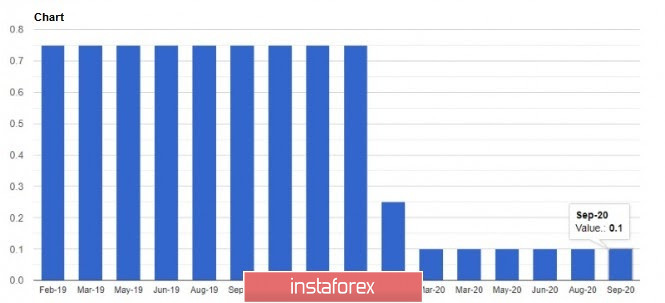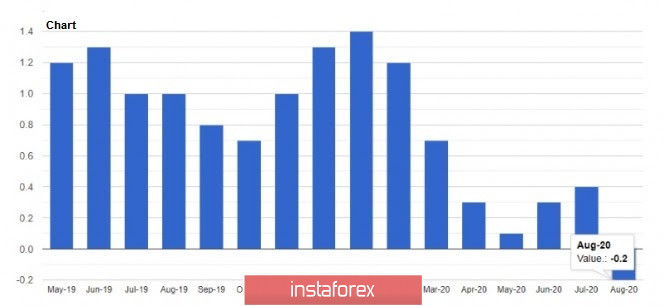The British pound declined against the US dollar today after the Bank of England's expected interest rate decision. No changes were made to the asset repurchase program. The only thing that the British regulator has focused on is the possibility of additional measures to stimulate the economy if necessary. The Bank of England's obvious wait-and-see attitude is understandable since it is not known how the economy will continue to recover, which showed a fairly good pace in the summer. The situation with the Brexit trade agreement also carries huge risks. A similar point of view is shared by the central bank.

The Bank of England may decide to increase the quantitative easing program after the meeting in November. However, many questions are raised about the prospect of negative rates, which may increase pressure on the pound if this probability becomes more real. Bank of England Governor Andrew Bailey has repeatedly pointed out that the most convenient period for negative interest rates is when the economy has managed to recover from the crisis and is showing growth. Introducing negative rates during a crisis is not the best solution. But such measures can be put aside if the UK and the EU still manage to avoid a no-deal Brexit. So far, everything is developing according to a different scenario.
As it became known today, the Bank of England left the key interest rate unchanged at 0.1%. The target volume of the asset purchase program also remained unchanged at 745 billion pounds. The regulator noted that the latest economic data was better than expected, however, the recent increase in infections may put pressure on the economic recovery. This suggests that, if necessary, the Bank of England may resort to a more lenient monetary policy and increase the volume of bond purchases.

As noted above, the main risks now are the loss of the summer pace of recovery in the UK economy. And given that some European countries have already begun to introduce restrictive and quarantine measures due to the new outbreak of the coronavirus pandemic, it is unlikely that this problem will bypass the UK, putting additional pressure on the health sector. The end of labor market support programs at the end of this fall will also not give confidence and optimism to households, which may affect their mood and spending, further slowing down the economy. Do not forget about the main headache of this autumn – about Brexit. Let me remind you that Brussels gave the UK an ultimatum, demanding to withdraw the bill sent to parliament, which recently passed the second reading and was adopted by the majority. The final voting procedure remains. According to the EU, the new terms completely negate the basis of the Brexit agreement signed last year. The EU said that the UK has only until the end of September this year to cancel the development of a bill that undermines the foundations of the Brexit agreement. The EU also warned the UK about possible legal measures, saying that the adoption of this bill would put the negotiations at risk. In their opinion, the new bill is a serious violation of the agreement on the UK's withdrawal from the EU and it is primarily about the Irish borders. If passed, the new bill would invalidate the provisions of the Brexit agreement that prevent the creation of a border between Northern Ireland and the Republic of Ireland. This will completely negate all the efforts that formed the basis of the trade agreement between the UK and the EU.
As for the technical picture of the GBPUSD pair, the bears are trying to regain control of the market by the end of the week after the Bank of England's decisions, and they may succeed. If the day closes below the level of 1.2920, tomorrow we will likely see a new movement of the trading instrument already in the area of the major support of 1.2850, the breakthrough of which will provide a direct road to the weekly lows in the area of 1.2775. If the bulls are stronger and manage to maintain the level of 1.2920, then we can expect the pair to grow again to the week's maximum of 1.3005 and its breakout, which will open a direct road to the area of 1.3100 and 1.3180.
EURUSD

The European currency managed to recover all the losses that could be observed in the Asian session, although the data on Eurozone inflation failed to please traders and economists, which indicates the sluggish pace of recovery in the Eurozone economy at the end of this summer. The report shows that the Eurozone CPI index in August 2020 fell by 0.2% compared to the same period of the previous year after rising by 0.4% in July, which fully coincided with economists' forecasts. By the way, the ECB's target inflation rate is set at around 2%.
From a technical point of view, much will depend on how the bulls cope with the level of 1.1810 today, since the weekly lows have already been updated, and if there is no activity from buyers of risky assets, the bears will prefer to close the week at its lows with great pleasure, continuing the downward trend formed since the beginning of September this year.





















